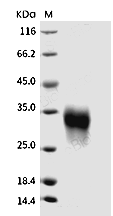Shopping Cart
- Remove All
 Your shopping cart is currently empty
Your shopping cart is currently empty

CD74 Protein, Human, Recombinant (His) is expressed in HEK293 mammalian cells with His tag. The predicted molecular weight is 20.4 kDa and the accession number is P04233-2.

| Pack Size | Price | Availability | Quantity |
|---|---|---|---|
| 100 μg | $373 | In Stock | |
| 200 μg | $659 | 7-10 days | |
| 500 μg | $2,170 | 7-10 days |
| Biological Activity | Measured by its binding ability in a functional ELISA. Immobilized human CD74 at 5 μg/ml (100 μl/well) can bind biotinylated human CTSL1 with a linear range of 3.2-400 ng/ml. |
| Description | CD74 Protein, Human, Recombinant (His) is expressed in HEK293 mammalian cells with His tag. The predicted molecular weight is 20.4 kDa and the accession number is P04233-2. |
| Species | Human |
| Expression System | HEK293 Cells |
| Tag | N-His |
| Accession Number | P04233-2 |
| Synonyms | II,Ia-γ,Ia-GAMMA,HLADG,DHLAG,CD74 molecule, major histocompatibility complex, class II invariant chain |
| Construction | A DNA sequence encoding the extracellular domain (Gln 73-Met 232) of human CD74 isoform b (NP_004346.1) was fused with a polyhistidine tag at the N-terminus. Predicted N terminal: His |
| Protein Purity | > 80 % as determined by SDS-PAGE  |
| Molecular Weight | 20.4 kDa (predicted); 31.9 kDa (reducing condition, due to glycosylation) |
| Endotoxin | < 1.0 EU/μg of the protein as determined by the LAL method. |
| Formulation | Lyophilized from a solution filtered through a 0.22 μm filter, containing PBS, pH 7.4. Typically, a mixture containing 5% to 8% trehalose, mannitol, and 0.01% Tween 80 is incorporated as a protective agent before lyophilization. |
| Reconstitution | A Certificate of Analysis (CoA) containing reconstitution instructions is included with the products. Please refer to the CoA for detailed information. |
| Stability & Storage | It is recommended to store recombinant proteins at -20°C to -80°C for future use. Lyophilized powders can be stably stored for over 12 months, while liquid products can be stored for 6-12 months at -80°C. For reconstituted protein solutions, the solution can be stored at -20°C to -80°C for at least 3 months. Please avoid multiple freeze-thaw cycles and store products in aliquots. |
| Shipping | In general, Lyophilized powders are shipping with blue ice. |
| Research Background | The cluster of differentiation (CD) system is commonly used as cell markers in Immunophenotyping. Different kinds of cells in the immune system can be identified through the surface CD molecules associating with the immune function of the cell. There are more than 320 CD unique clusters and subclusters have been identified. Some of the CD molecules serve as receptors or ligands important to the cell through initiating a signal cascade which then alter the behavior of the cell. Some CD proteins do not take part in cell signal process but have other functions such as cell adhesion. CD74, also known as HLA class2 histocompatibility antigen gamma chain and HLA-DR antigens-associated invariant chain, is a polypeptide involved in the formation and transport of MHC class2 protein. CD74 is expressed by B cells, macrophages, and Reed-Sternberg cells. When MHC class 2 protein was in the rough ER, its peptide-binding cleft was blocked by CD74 to prevent it from interacting with the endogenous peptides. CD74 also serves to facilitate MHC class2's export from ER. |

Copyright © 2015-2025 TargetMol Chemicals Inc. All Rights Reserved.